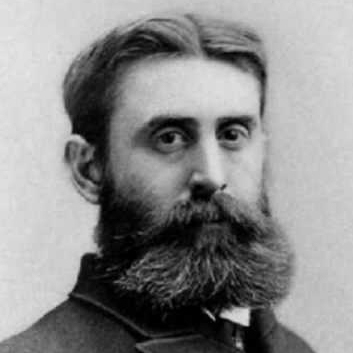
Quotes by B.B. Warfield
The one is addressed generally to all intelligent creatures, and is therefore accessible to all men; the other is addressed to a special class of sinners, to whom God would make known His salvation. The one has in view to meet and supply the natural need of creatures for knowledge of their God; the other to rescue broken and deformed sinners from their sin and its consequences.
A dozen ignorant peasants proclaiming a crucified Jew as the founder of a new faith; bearing as the symbol of their worship an instrument which was the sign of ignominy, slavery and crime; preaching what must have seemed an absurd doctrine of humility, patient suffering and love to enemies – graces undreamed of before; demanding what must have seemed an absurd worship for one who had died like a malefactor and a slave, and making what must have seemed an absurd promise of everlasting life through one who had himself died, and that between two thieves.
The Divine Origin of the Bible, Philadelphia: Presbyterian Board of Publication, 1991, I.432.
Justification is through faith, not on account of faith.
The marvel of marvels is not that God, in His infinite love, has not elected all this guilty race to be saved, but that He has elected any.
In the infinite wisdom of the Lord of all the earth, each event falls with exact precision into its proper place in the unfolding of His divine plan. Nothing, however small, however strange, occurs without His ordering, or without its particular fitness for its place in the working out of His purpose; and the end of all shall be the manifestation of His glory, and the accumulation of His praise.
Quoted in: TULIP, The Five Points of Calvinism in the Light of Scripture by Duane Edward Spencer, Baker, 1979, p. 15.
There is one only and true God, but in the unity of the Godhead there are three coeternal and coequal Persons, the same in substance but distinct in subsistence.
For Calvinism is just religion in its purity… Calvinism is, therefore, that type of thought in which there comes to its rights the truly religious attitude of utter dependence on God and humble trust in His mercy alone for salvation… This is why those who have caught a glimpse of these things, love with passion what men call “Calvinism,” sometimes with an air of contempt; and why they cling to it with enthusiasm.
[Miraculous gifts] were not for the possession of the primitive Christian as such; nor for that matter of the Apostolic Church or the Apostolic age for themselves; they were distinctively the authentication of the Apostles. They were part of the credentials of the apostles as the authoritative agents of God in founding the church. Their function thus confirmed them to distinctively the Apostolic Church, and they necessarily passed away with it.
He who begins by seeking God within himself may end by confusing himself with God.
To Paul, the human race is made up of families, and every several organism, the church included, is composed of families, united together by this or that bond. The relation of the sexes in the family follows it therefore into the church. To the feminist movement the human race is made up of individuals; a woman is just another individual by the side of the man; and it can see no reason for any differences in dealing with the two. And, indeed, if we can ignore the great fundamental natural difference of sex, and destroy the great fundamental social unit of the family, in the interest of individualism, there does not seem any reason why we should not wipe out the differences established by Paul between the sexes in the church.
These gifts were not the possession of the primitive Christians as such; nor for that matter of the Apostolic Church or the Apostolic age for themselves; they were distinctively the authentication of the Apostles. They were part of the credentials of the Apostles as the authoritative agents of God in founding the church. Their function thus confined them to distinctively the Apostolic Church, and they necessarily passed away with it. Of this we may make sure on the ground both of principle and fact; that is to say both under the guidance of the New Testament teaching as to their origin and nature, and on the credit of the testimony of later ages as to their cessation.
[T]here is nothing in us or done by us at any stage of our earthly development because of which we are acceptable to God. We must always be accepted for Christ’s sake or we cannot ever be accepted at all. This is not true of us only “when we believe,” it is just as true after we have believed. It will continue to be true as long as we live… It is always, on His “blood and righteousness” alone that we can rest. There is never anything that we are or have or do that can take His place or that take a place along with Him. We are always unworthy, and all that we have or do of good is always of pure grace.
It give expression not merely to our sense that we have received salvation from Him, but also to our appreciation of what it cost Him to procure this salvation for us. It is the name specifically of the Christ of the cross. Whenever we pronounce it, the cross is placarded before our eyes and our hearts are filled with loving remembrance of not only that Christ has given us salvation, but that He paid a mighty price for it.
The Greek term has…nothing to say of inspiring or of inspiration: it speaks only of “spiring” or “spiration”. What is says of Scripture is, not that it is “breathed into by God” or is the product of the Divine “inbreathing” into its human authors, but that it is breathed out by God, “God-breathed”, the product of the creative breath of God… When Paul declares, then, that “every Scripture”, or “all Scripture” is the product of the Divine breath, “is God-breathed”, he asserts with as much energy as he could employ that Scripture is the product of a specifically Divine operation.
It is never on account of its formal nature as a psychic act that faith is conceived in Scripture to be saving. It is not, strictly speaking, even faith in Christ that saves, but Christ that saves through faith. The saving power resides exclusively, not in the act of faith or the attitude of faith or nature of faith, but in the object of faith.
Our faith itself, though it be the bond of our union with Christ through which we receive all His blessings, is not our saviour. We have but one Saviour; and that one Saviour is Jesus Christ our Lord. Nothing that we are and nothing that we can do enters in the slightest measure into the ground of our acceptance with God. Jesus did it all.
There is nothing in us or done by us, at any stage of our earthly development, because of which we are acceptable to God. We must always be accepted for Christ’s sake, or we cannot be accepted at all. This is not true of us only when we believe. It is just as true after we have believed. It will continue to be true as long as we live. Our need of Christ does not cease with our believing; nor does the nature of our relation to Him or to God through Him ever alter, no matter what our attainments in Christian graces or our achievements in behavior may be. It is always on His “blood and righteousness” alone that we can rest.
Our self-abnegation is thus not for our own sake but for the sake of others. And thus it is not to mere self-denial that Christ calls us but specifically to self-sacrifice, not to unselfing ourselves but to unselfishing ourselves. Self-denial for its own sake is in its very nature ascetic, monkish. It concentrates our whole attention on self—self-knowledge, self-control – and can therefore eventuate in nothing other than the very apotheosis of selfishness. At best it succeeds only in subjecting the outer self to the inner self or the lower self to the higher self, and only the more surely falls into the slough of self-seeking, that it partially conceals the selfishness of its goal by refining its ideal of self and excluding its grosser and more outward elements. Self-denial, then, drives to the cloister, narrows and contracts the soul, murders within us all innocent desires, dries up all the springs of sympathy, and nurses and coddles our self-importance until we grow so great in our own esteem as to be careless of the trials and sufferings, the joys and aspirations, the strivings and failures and successes of our fellow-men. Self-denial, thus understood, will make us cold, hard, unsympathetic—proud, arrogant, self-esteeming—fanatical, overbearing, cruel. It may make monks and Stoics, it cannot make Christians.
About Warfield, B.B.
Benjamin Breckinridge Warfield (November 5, 1851 – February 16, 1921) was the principal of Princeton Seminary from 1887 to 1921. He is considered the last great Princeton theologian before the split in 1929 that formed Westminster Seminary and the Orthodox Presbyterian Church.
